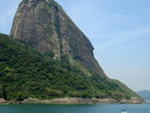Brazil: Hazardous Waste Management
 Summary
Summary This report provides information on the hazardous waste and contaminated sites sectors in Brazil. The industrial waste management business is growing in Brazil and presents considerable opportunities for suppliers of new waste management technologies.
Hazardous Waste
Statistics from the Brazilian Association of Waste Treatment Companies (ABETRE) for 2007 showed that the volume of hazardous waste treated in Brazil reached 5.9 million metric tons, an increase of 30% over 2006. ABETRE expects a similar growth rate for 2008. In 2007, ABETRE’s members gained a significant number of new clients, indicating that a larger number of firms started to deal with their environmental liabilities. About 25% of the waste disposed consisted of contaminated soils or waste that resulted from remediation projects.
In 2007, the hazardous waste sector business in Brazil generated revenues of US$ 856 million (R$ 1.7 billion), of which 81% was related to industrial waste.
The increased demand for hazardous waste treatment services is partially attributed to the Sao Paulo environmental authority’s decision to reduce the price of the Cadri for small companies. The Cadri is the Industrial Waste Treatment Approval Certificate, a mandatory document required for the appropriate waste destination process. The state of Sao Paulo generates about 500,000 metric tons of hazardous waste per year.
Contaminated Sites
ABETRE’s figures indicated that much of the waste sent for treatment resulted from the large growth in the destination of environmental liabilities (the amount of hazardous waste that resulted from remediation of contaminated sites). The volume grew from 691,000 metric tons in 2006 to 1,500,000 metric tons in 2007.
Contaminated Sites in the Sao Paulo State
Sao Paulo is the only Brazilian state that has statistics on contaminated sites. The statistics are relevant because of Sao Paulo’s economic importance - the state concentrates 40% of Brazil’s industrial production and about 25% of the country’s population. According to the Sao Paulo state environmental authority - CETESB, as of November 2007, Sao Paulo had 2,272 contaminated sites, of which 1,185 in the Sao Paulo metropolitan region and 743 in the city of Sao Paulo.
ABETRE’s members are private companies involved in hazardous waste treatment and disposal (incineration, co-processing, landfills, etc.); as well as in related services (management, collection, transportation, lab analysis and recycling). The list of members include large international groups, such as Veolia, Eco Processa (a joint venture of the French company Lafarge and Portuguese Cimpor) and Tribel (Bayer Group); Brazilian engineering firms that have international partner, such as Essencis (joint venture of Camargo Correia and the French Solvi) and large Brazilian engineering companies such as Cetrel of Odebrech group, among other companies.
Extracts from: Brazil: Hazardous Waste Management, 2008, U.S. Commerce Department
You can return to the main Market News page, or press the Back button on your browser.

